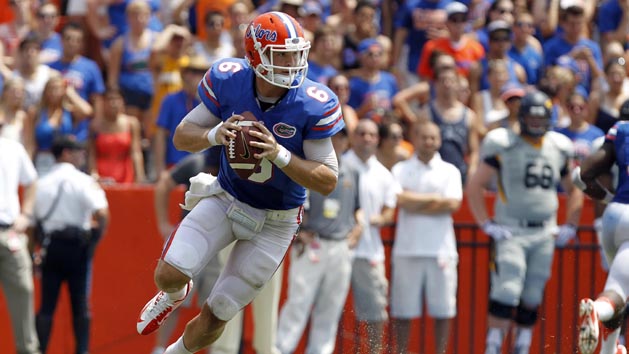
Will Muschamp knew something had to be done to fix his ailing offense.
Last year, Florida’s defense could play with just about anybody. The Gators were third in the conference in scoring defense last year (21.1 points per game) and were second in total defense (314.2 yards per game).
But, offensively, it was another story. The Gators were dead last in the SEC in scoring offense (18.8 ppg) and total offense (316.7 ypg).
There were obvious reasons for the Gators struggles. The injury bug hit the team hard. Florida lost star quarterback Jeff Driskel to a broken leg, and then it lost running back Matt Jones, who tore his radial meniscus in his knee. But the Gators problems went further than just injuries, and that’s why Muschamp decided he needed to inject some new life into his offense.
He did that by firing offensive coordinator Brent Pease and hiring Kurt Roper away from Duke, where he coordinated an offense that produced 10 wins for the Blue Devils last season.
“After the season was over, we obviously needed to make some improvements on the offensive side of the ball,” Muschamp told reporters. “As I looked at it, we needed more tempo, we needed to create more snaps, we needed to create more space plays, continue to stay balanced, be diverse in our background moving forward. I felt like being in the gun would help some of our personnel, and that’s where we’re headed.”
Roper is an advocate of an up-tempo offensive approach. The question is how quickly Roper can adopt his system to the current Florida personnel.
“I think you’ve got plenty of time through spring practice and through fall practice to make those decisions,” Roper said. “What we’re going to do, what we’ve always done, is you determine what your quarterback is good at executing, you determine what your five linemen are good at executing, and then through practice, you determine who has earned the right to have the football and you try to make your decisions based on that.
“You get 15 opportunities in spring to make those decisions and you get 29 practice opportunities in the fall. Everything moves fast but you’ve got to figure those things out.”
“If you can play the game with some tempo and speed and you can play it in space, you can create as many one-on-one tackle opportunities as you can,’’ Roper said. “If you can create a bunch of one-on-one tackle opportunities, then you have a chance to have positive yards and positive yards keep you on the field.”
The Gators did hold on to the football last season and even led the SEC in time of possession (33:49 per game average), but Florida’s inability to score really hurt the team in several games.
“Our whole philosophy on offense is points per game,” Roper said. “It’s not yards, it’s not going up and down the field, it’s how many points we can get. Hopefully we’re a PPG team.”
A lot of that responsibility in 2014 will depend on how well Driskel has recovered from his injury. If he’s healthy, he can be a major building block in a retooled Gators attack.
“I was very confident going into last year,’’ Driskel told The Gainesville Sun recently. “I think I would have had a good year. I’m going to keep doing what I was doing — watching film, working on footwork, getting together with the receivers. Don’t back off. Don’t hang my head because of the injury. Continue on the path I was on.”
The report on Jones isn’t as bright since he is going to require a second surgery on his knee.
“It is a little more lengthy,” Muschamp said. “This was torn all the way through. It’s a little more serious than a regular meniscus. We feel like, optimistically, he’ll be ready to go for summer workouts.”
The Gators were 4-8 last season but Muschamp is ready to insure that the 2013 season was just a bump in the road. A healthy Driskel and Jones, along with a new offensive approach under Roper, will go a long way toward making that happen.
